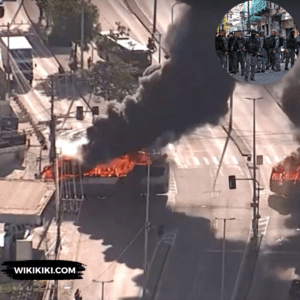Rio de Janeiro ended up in the midst of a violent crisis on October 23, 2023. Suspected members of Brazilian criminal groups set fire to at least 35 buses, four lorries, and even a train, in a display of violence that authorities and residents struggled to comprehend.

Also Read: Kharkiv: Russian Missile Strike on Post Office Kills 6, Injures 14
This attack came shortly after a police operation claimed the life of a senior paramilitary leader known as Matheus da Silva Rezende, a man named “The Lord of War.”
The attacks targeted the city’s public transport system, primarily in the western region, where rival criminal groups, referred to as militias, were vying for territorial control.
Rio Mayor Eduardo Paes, taken aback by the audacity of these acts, openly criticized the perpetrators on social media, labeling them “idiots” and “criminals.”
He expressed disbelief that public buses, paid for with public funds, were being set ablaze as a form of protest against the police operation.
In the aftermath of this violence, Rio’s public transport system was disrupted, causing chaos for commuters and forcing the cancellation of classes in schools in the affected areas.
The situation escalated as the military police apprehended 12 individuals suspected of committing “terrorist actions” related to the attacks.
Additionally, the city’s authorities issued a level-three alert on their five-level scale, warning residents and tourists of possible “high-impact incidents.”
Also Read: London: 100,000 Protesters Joined Pro-Palestinian March
The wave of bus burnings that engulfed Rio de Janeiro can be traced back to a police operation that resulted in the death of Matheus da Silva Rezende, the nephew and right-hand man of a militia boss known as “Zinho.”
Rio de Janeiro’s state Governor Claudio Castro described this operation as a “heavy blow” to the militia and emphasized that Rezende played a pivotal role as the “man of war” within the paramilitary group.
He was responsible for the turf wars that had long terrorized Rio’s residents. The rise of these militias in Rio is a complex issue.
Originally formed as neighborhood protection outfits to combat drug gangs, they have since evolved into criminal organizations that control more than half of the city’s territory and run multiple rackets.
These groups often include current and former police officers among their ranks, making them a formidable and highly influential presence in the city.
The violence did not stop at the torching of buses. Criminals also targeted lorries and a train, creating a chaotic and dangerous environment in Rio’s western regions.
As the city grappled with this display of violence, Governor Claudio Castro expressed his determination to strike back against organized crime.
He labeled the attacks as “terrorist acts,” underlining the situation and vowing to wage a battle against these criminal elements.
Also Read: Brussels: Police Shoot Dead Suspected Gunman Accused of Killing 2
The eruption of violence had severe consequences for Rio de Janeiro. Parts of the city came to a standstill, as the attacks forced the closure of at least 45 schools, affecting thousands of students.
O Globo, a major Brazilian newspaper, declared that “Rio is under siege,” highlighting the unprecedented nature of the violence.
The situation was so dire that the city’s authorities urged citizens to avoid the affected areas, indicating the magnitude of the “high-impact occurrence.”
The attacks took place in multiple areas across the western region of Rio, including Cosmos, Campo Grande, Inhoaíba, Guaratiba, Madureira, Paciência, Santa Cruz, Sepetiba, and Recreio dos Bandeirantes, collectively home to approximately one million people.
The violence exposed the terrifying reach and influence of these militia groups, which have seized control of huge portions of the city over the past two decades.
These militia groups have now morphed into criminal mafias that control areas nearly the size of Birmingham, the UK’s second-largest city.
Governor Castro’s commitment to battling these criminal organizations is a reminder of the challenge authorities face in maintaining law and order in the face of such a formidable adversary.
Also Read: Israel-Hamas Conflict Day 10: All You Need to Know



/cloudfront-us-east-2.images.arcpublishing.com/reuters/5LDPGUACFVKL7CFWG6WSTYAR5I.jpg)




















